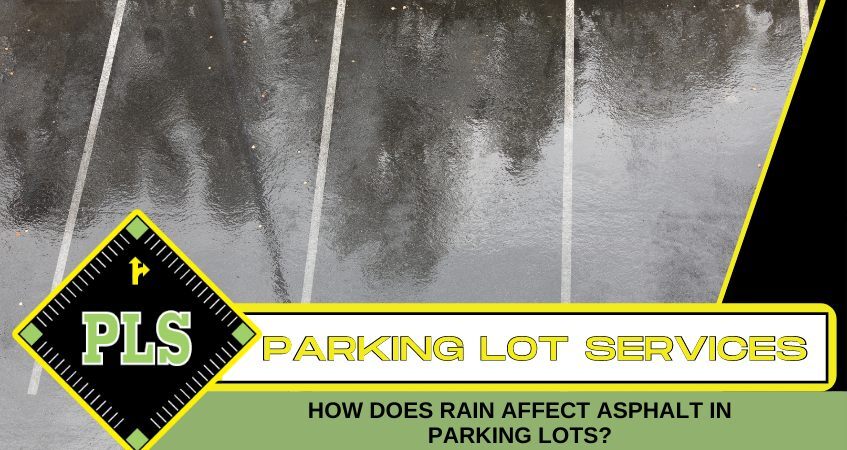Understanding how rain affects asphalt is important in keeping it well-maintained and avoiding long-term damage.
An asphalt parking lot will usually last around twenty or even thirty years with proper maintenance. However, rain damage can significantly impact the lifespan of your parking lot. Excessive moisture can impact the structural integrity of your parking lot pavement and cause it to quickly deteriorate. Keeping a few things in mind is important in knowing how rain impacts asphalt pavement. So, how does rain affect asphalt?
How Does Rain Affect Asphalt?
Light rain doesn’t make much of an impact on asphalt pavement. However, heavy rain that results in standing water can create significant damages. Making sure your parking lot has an adequate drainage system is essential to avoid water damage. Standing water can eventually lead to cracks and potholes throughout your parking lot. Constantly scheduling asphalt repairs can get expensive over time due to water damage.
An asphalt parking lot can experience damages in a variety of ways due to excess water. For example, asphalt shrinkage can happen if the gravel components are exposed to the outside elements. Small cracks can also appear due to the water seeping through the pavement. These cracks will often get bigger and can result in potholes. Scheduling pothole repair as soon as possible is important in keeping these damages to a minimum.
Why Asphalt Installation is Impossible During Rainy Weather
Trying to pave in the rain is nearly an impossible task, as the oil will rise to the surface on freshly paved asphalt. Asphalt installation will always need to occur during dry weather, as a sunny day will help expedite the curing process. The temperature is also important during asphalt installation, as it needs to be a minimum of 50 degrees Fahrenheit. Working with an experienced asphalt contractor is always important to ensure your pavement is properly installed and that it will last for a long time.
How to Prevent Water Damage
One way to protect your parking lot is to schedule sealcoating services every two years. Sealcoating a parking lot will repel water, which is essential in avoiding long-term damages while also saving you money over the long-term. An asphalt paving company can sealcoat your parking lot, as it gives the top layer of your pavement an added level of protection from the elements. However, it’s a good idea to wait at least six months before sealcoating newly laid asphalt.
Why Parking Lot Maintenance is Important
Understanding how rain affects asphalt is critical in avoiding significant damages. Scheduling parking lot maintenance is an excellent way to stay proactive and further extend the lifespan of your pavement. Installing a proper drainage channel is one way to limit water damage, while using an asphalt crack sealant is important for repairing small cracks in the pavement. Pothole repair services are also crucial for safety, and they will improve the appearance of your parking lot.
Benefits of a Drainage System
Installing a drainage system for your parking lot makes it much easier to manage excess water and prevent long-term damages. A drainage system also makes it safer for customers and employees to walk across your parking lot without having to constantly walk around large puddles of water. Sweeping your parking lot on a regular basis to ensure it’s free from debris is also important in allowing your drainage system to work effectively.
Contact Parking Lot Services (PLS) for All of Your Maintenance Needs
Parking Lot Services (PLS) offers high-quality paving services for customers throughout the Tampa Bay area. Our goal is to keep your business parking lot looking great for many years. We offer a wide range of parking lot services, such as asphalt repair, parking lot striping, ADA compliance, sealcoating, and maintenance services for business owners and commercial properties. Give PLS a phone call to schedule a free consultation and learn even more information on how rain affects asphalt pavements!

